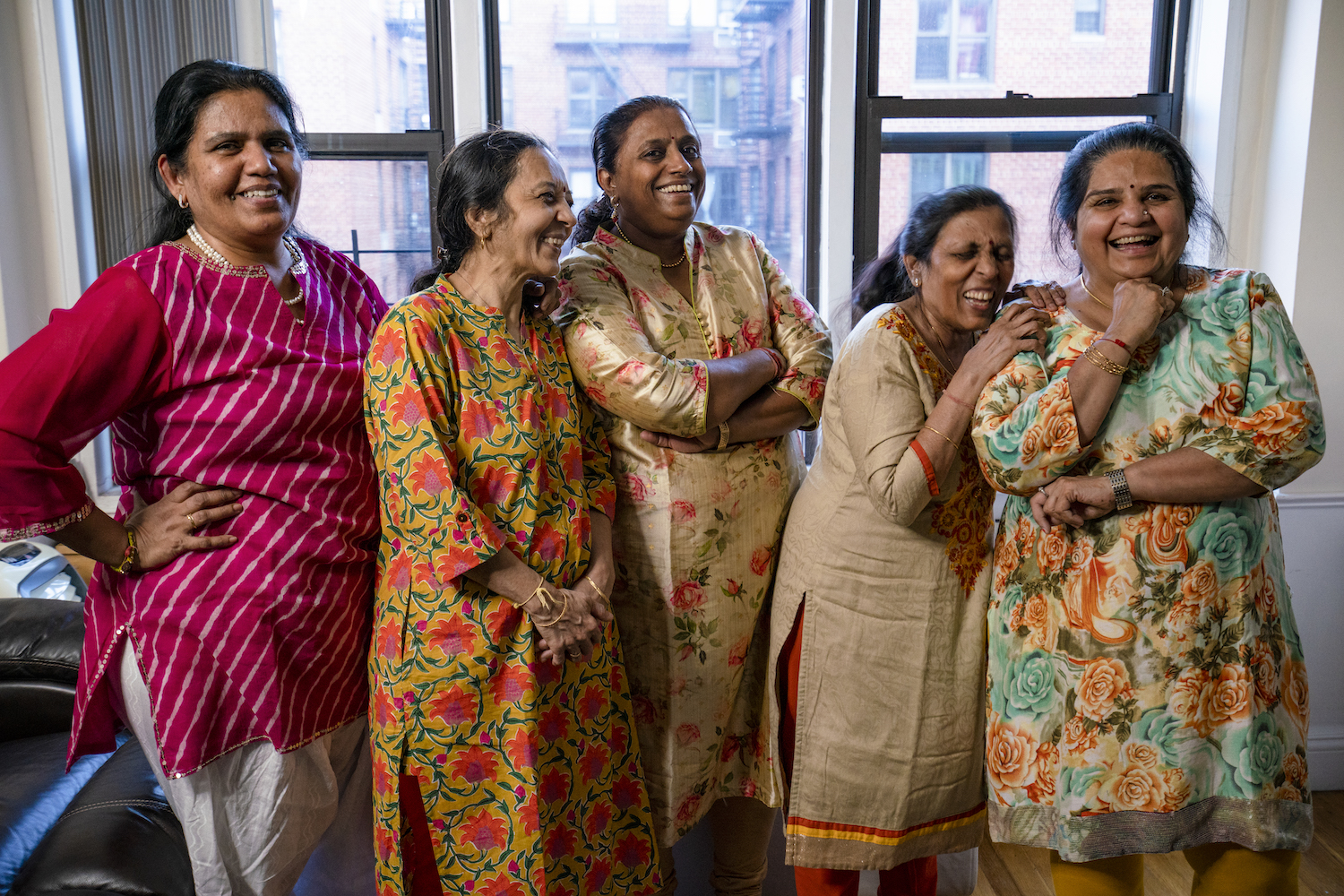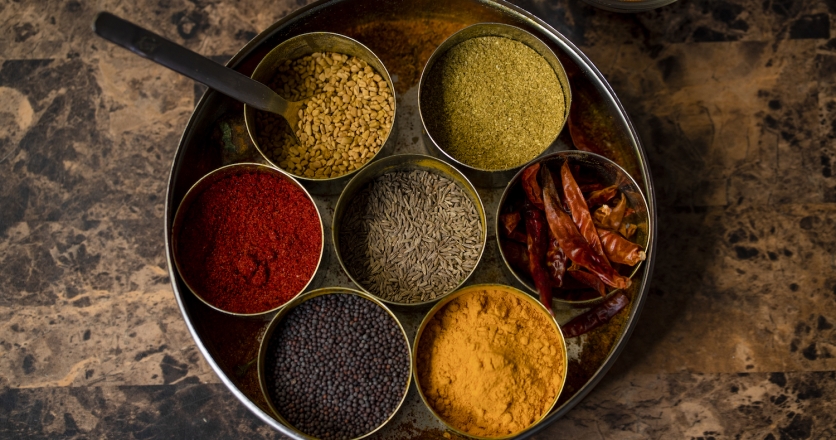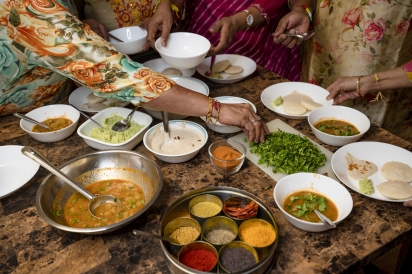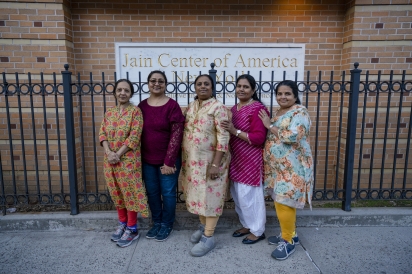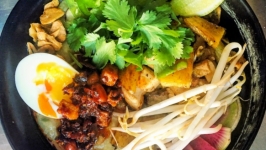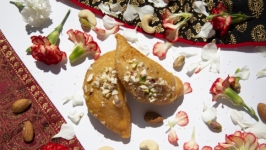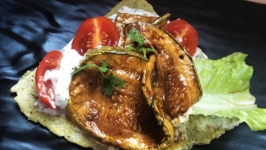The Temple Aunties
Editor's Note: This article was written before the COVID-19 crisis for what would have been our print Women's Issue.
“I am incomplete without them,” said Hema Zota, a woman in her 50s, gesturing towards her friends—a group of easily excitable, kind and attentive women who volunteer with her at the Jain Center in Elmhurst—the local Derasar, or temple for followers of Jainism—one of the first of its kind in the United States. Almost every Sunday morning for over a decade, Hema has cooked for hundreds of devotees at the Derasar. Now the cooking team’s leader, Hema is known for her ability to get things done. And also, for her kindness.
On a balmy day last summer, Hema and her friends Panna, Vibha, Kamini and Aruna gathered at Hema’s home to celebrate her wedding anniversary. (Missing from this particular interview were Manda and Bharti.) Hema’s Elmhurst apartment is steps away from the impressive Derasar; the center was once a house. “It’s huge now,” said Vibha, mentioning the idol’s many precious stones. “I’m proud to live near it.”
All these women except one, who recently moved to New Jersey, live near the temple. Through all their life stages, they’ve maintained a connection to the temple. The one who lives in New Jersey makes the heroic two-hour commute to help the others with Sunday cooking. The temple is the center of their community—and sense of belonging. The women take great pride in their Derasar—“the best community, especially if you don’t have much family.”
According to the Jain Center of America’s website, the Derasar was built by the first wave of Jain immigrants in the mid 1960s who informally gathered in Manhattan until forming this organization in 1976. In 1981, they purchased their first building. Nowadays, you can eat, pray and learn there; the Sunday school, Pathshala, teaches around 100 students the tenets of Jainism, a religion dating back about 2,500 years, predicated on the pursuit of nonviolence.
Nonviolence, in Jainism, extends to food, too. In India, Jains are known for their strict diets. Anything plucked from underground is not consumed—this includes potatoes, garlic, onions and carrots. Too many tiny life forms would be injured in the uprooting of vegetables considered ananthkay, one body containing multiple lives. The women listed other vegetables they don’t cook, at least for the Derasar: eggplant; leafy vegetables like spinach, cabbage and lettuce; cauliflower. Jain food tends to be vegan, but healthier and tastier, they contended: They’re wary of using too much oil or soybean. But these restrictions foster ingenuity.
Kitchen employees arrive around 8am, and start soaking the rice, beans and other ingredients. Everything must be cooked fresh. They use nothing canned, and anything frozen is used sparingly.
“Our religion doesn’t allow leftovers,” said Hema, which means the women must find ways to cook efficiently and minimize waste. Her son persuaded the derasar to compost the scraps from their ingredients, which they buy in bulk first thing in the morning, completely paid for by temple donations.
Volunteers show up at 10am. The kitchen head gives them an idea of how many people to expect—this ranges from 100 to as many as 700. The menu, which varies from week to week, includes at least four items. “Daal, bhat, shak, rotli,” they say, a common Gujarati refrain. Lentils, rice, vegetables, bread. More elaborate meals also include sweets, salty snacks, paapad, chutney.
“Have you ever had undhiyu?” asked Vibha. It’s a mixed vegetable dish, often prepared in the winter. It’s like the word “undhu,” which means upside down, since this South Gujarat dish is traditionally cooked upside down in underground pots. “We use plantains,” the friends chimed in, when asked what they’d do without the staples of eggplant and potato that add texture and thickness. (The best friends tend to answer simultaneously—they’re in sync in both message and manner.) They add beans, peas, tomatoes, fenugreek, coconut.
The Derasar’s food is known both for its quality, and its range. They make toor dal, kadi, chole. They also cook traditional street food like pav bhaji, and even chaat: pani puri, sev puri, bhel, dahi puri. Chaat is a crowd favorite. “When we come over to Hema’s, she always offers us pani puri. Regardless of how full we are, we always say yes,” said Vibha. Panna said she can eat 50 pani puris in one sitting.
Food restrictions are amped up for five days a month, as per the lunar calendar, and many fast and meditate (pratikramana, or “turning back,”) during the holy time of Paryushana. It’s tough, keeping these food restrictions, but less difficult with community. “We take care of everyone.” The women eat only after they make sure everyone else has been fed.
These best friends have intentionally built community, some over decades. They cook for others; they worry about how to pass down their religion to their kids. They go to picnics in Central Park, weekend excursions to the Poconos, bus tours to other temples. They go out to Jackson Heights “to shop.” They walk around the stores, go to Raja Sweets and Fast Food, Samudra Chaat House. “We take brunch.”
The giggling momentarily stops. “We’re going to be together until we use walkers.” The laughter starts again.


